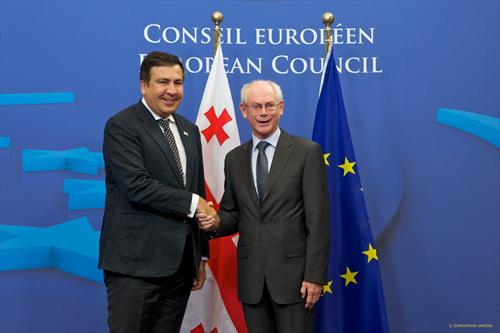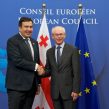
Georgia Between Russia and the European Union: Toward the Vilnius Summit and Beyond (Part Two)
Publication: Eurasia Daily Monitor Volume: 10 Issue: 213
By:

To balance its contradictory goals—advancing Georgia’s Western orientation while conciliating Russia—Prime Minister Bidzina Ivanishvili’s government initiated a “reset” of Georgia-Russia relations from the moment it took office in November 2012 (see Part One, EDM, November 25).
Twelve months later, Georgian Dream leaders have no significant Russian rewards to show for their effort. In net terms, Russia’s recent “borderization” of South Ossetia (barbed wire fence building—see EDM, September 23, October 2) is a setback that balances the modest gains on other issues in the overall account of Georgia-Russia relations.
Strategically, Ivanishvili and his entourage miscalculated by initiating this reset unilaterally. Undertaking a reset initiative implies accepting responsibility for the unsatisfactory state of relations. The initiating government will bear the main onus for correcting that situation. Through its efforts, it acknowledges that it needs the other party’s cooperation more than vice-versa. It will strive for tangible results within a certain time-frame, while the other side can string the process along or define tradeoffs to be made.
Tactically, Ivanishvili’s team erred by offering concessions unilaterally and pre-emptively to Moscow (see EDM, December 4, 2012; February 26, 2013). In the reset’s early, immature phase, such concessions included: suggesting that Russia reopen the railroad in occupied Abkhazia, questioning the benefits of the Kars-Tbilisi-Baku railroad, gratuitously criticizing the commercial terms of Azerbaijani gas supplies to Georgia, terminating the PIK television channel’s broadcasts to the North Caucasus and farther afield in Russia, and releasing convicted Russian spies as part of an amnesty for „political prisoners“ (then-internal affairs minister, now prime minister Irakli Gharibashvili says that he opposed that release—Civil Georgia, November 20).
Beyond that early phase, Ivanishvili and his law enforcement team continually blamed former president Mikheil Saakashvili’s government for the outbreak of the 2008 war, and implied that the previous government may have helped North Caucasus “terrorists” against Russia (see EDM, June 11–13, 17). Such allegations sought to incriminate the UNM opposition party and please Moscow at the expense of Georgia’s national interest. By threatening to prosecute the former president (whose immunity expired on November 17), Ivanishvili seemed prepared to risk entrapping Georgia into a situation resembling that of Ukraine with former prime minister Yulia Tymoshenko. In Georgia’s case, moreover, prosecuting Saakashvili would have vindicated the Kremlin’s case against Georgia itself. Ivanishvili has resigned as prime minister effective from November 20. In the run-up to the Vilnius summit, influential European politicians strongly cautioned Ivanishvili against pursuing political vendettas (RFE/RL, November 5; Civil Georgia, October 23, November 5, 6, 7; see EDM, November 22).
Georgian Dream leaders continue telling Moscow that the “Saakashvili factor” is no longer here to “create problems” in bilateral relations, as President Giorgi Margvelashvili recently told Russian state TV. Such statements exonerate Russia of its responsibility for those “problems.” Margvelashvili failed to mention the occupation of Georgia’s territories in his statement. Russia’s Deputy Foreign Affairs Minister Grigory Karasin, in charge of bilateral relations with Georgia, welcomed Margvelashvili’s remarks as “constructive.” He added, “[Margvelashvili’s] view on the normalization of relations largely echoes our [the Russian government’s] view” and “were positively received by us” (Russian TV Channel One, November 10; Civil Georgia, November 14, 21).
In Moscow’s view, normalization apparently implies Georgia’s acceptance of the results of the 2008 war and of Georgia’s responsibility for the situation. This would not necessarily preclude re-negotiation at some undefined future time, proceeding however in any case from acceptance of the “new realities” as the baseline.
Karasin and Zurab Abashidze, special envoy of Georgia’s prime minister for relations with Russia, met in Prague on November 21 for the fifth round of negotiations (this format operates since December 2012 on issues other than territories or foreign policy). Both diplomats expressed overall satisfaction with the negotiations over economic and “humanitarian matters” (travel visas, cultural contacts). Karasin warned against “inflated expectations that could cause a freezing of relations” (Civil Georgia, November 21); thus, it is Moscow that determines the pace of evolutions in bilateral relations.
Georgia and the European Union will initial a deep and comprehensive free trade agreement at the Vilnius summit, and will sign and bring the agreement into force during 2014. This agreement will significantly encourage investment in Georgia, not only from EU investors but also from non-EU ones, interested in exporting to the EU market. In the short term at least, Russian investors already cognizant of Georgia might act faster than European investors. The case of the Borjomi mineral water company, a Georgian national asset, provides a cautionary tale in this regard. The Alfa-Group of Russian billionaires bought the controlling stake in the Borjomi company this year. Other Russian cash-rich investors could snap up more Georgian firms to take advantage of Georgia’s free trade agreement with the EU. To avoid the repetition of such takeovers, the Georgian government will have to avoid laissez-faire attitudes toward such a prospect.
Beyond the Vilnius summit, the European Union will be able to increase its role in offsetting Russia’s instruments of leverage on Georgia (see EDM, November 25). It is well within the EU’s means to:
• Ensure a lasting security presence on the ground through the European Union’s Monitoring Mission (EUMM, comprised of 200 unarmed observers) along the demarcation lines with the Russian-occupied Abkhazia and South Ossetia. Regularly prolong the EUMM’s mandate at intervals longer than 15 months. Remonstrate directly on the Brussels-Moscow level (not just from the EUMM in Georgia) against Russia’s breaches of the armistice agreement, compounded recently by “borderization.” Continue using the term “occupation” in the public discourse with specific reference to Russia’s military presence. The term “Russian military occupation of Abkhazia and South Ossetia” could be more helpful than simply “occupied territories” for reaching out to local residents.
• Assist Georgia to accelerate the implementation of its Visa Liberalization Action Plan (VLAP) for Georgia’s citizens to qualify for visa-free travel to the EU (Schengen area). Georgia began relatively late with the VLAP, but the Vilnius summit will ascertain good progress in Georgia’s implementation of the plan’s first phase and related benchmarks. Publicize the availability of visa-free travel to the EU for residents of Abkhazia and South Ossetia, once Georgia completes this plan.
• Caution the Georgian government continually against targeting officials of the former government and supporters of the UNM opposition party through political misuse of law enforcement and the judiciary. At the same time (as Saakashvili and the currently jailed UNM leader Vano Merabishbili have themselves recommended), do not turn this issue into a precondition to signing and ratifying the Georgia-EU Association Agreement and free trade agreement next year. Avoid falling into another Tymoshenko-like trap in Georgia. Instead, work quietly with the Georgian government to stop persecutions without losing political face.
• Capitalize more effectively on Georgia’s as yet under-utilized value, as part of the Azerbaijan-Georgia-Turkey corridor, for the transit of Caspian oil and gas to Europe.




